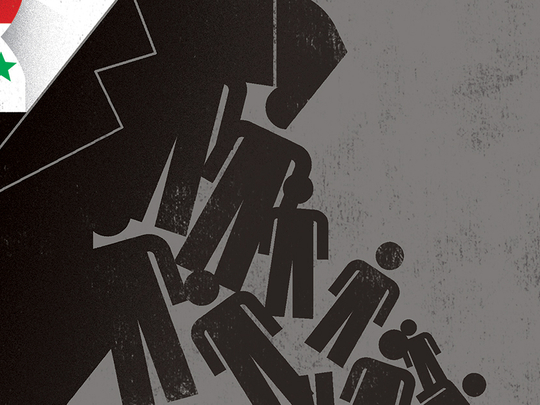
It is very unlikely that US President Barack Obama will take any meaningful action before his tenure expires in January, 2017, to help stop the killing machine in Syria. Therefore, his legacy will be tarnished in the eyes of many historians who closely follow the unravelling events in the Middle East region and beyond. Obama’s views of world affairs and America’s global role were gradually made clear after he won the presidential election in November 2008. In summary: pulling his country out of world crises.
However, with the tragic situation in Syria continuously getting bloodier despite the United Nations’ declared ceasefire, whatever Obama opts to do, it will be too little too late.
This tragic war could have been averted had the US, Russia and the EU jointly intervened to curtail the regime’s hands in Damascus immediately after the country’s president, Bashar Al Assad, allowed his bogey men to kill and maim young people demonstrating in the southern city of Daraa.
What began as a peaceful uprising five years ago has sadly turned into a full-scale, ugly war that has left more than 300,000 people dead (other estimates put the death toll at 470,000), destroyed the country and left the door wide open for regional and global powers to intervene.
This has led Syria to be uniquely considered by war historians as a country with no plausible future in sight. The likely result of the conflict is tearing the country apart and dividing it into uncontrollable cantons for many years.
After 46 years of the Al Assad dynasty’s iron rule, particularly during the era of Bashar Al Assad, which began in 2000, high unemployment engulfed the country, while repression, widespread corruption and lack of political freedom have become the norm.
The country under Hafez Al Assad peculiarly enjoyed a degree of stability from the mid-1970s until his death in 2000, thanks to an understanding solidly based on an unwritten partnership deal between the regime and the country’s influential middle class business and commerce communities in major cities, including the capital.
This partnership rapidly began showing signs of cracks immediately after the assassination of billionaire and then Lebanese prime minister Rafik Hariri in a massive bomb that struck his motorcade in Beirut in 2005. Having lost Hariri’s generous and regular handouts, Bashar Al Assad decided to change the rules of the understanding his father had reached with the country’s business community.
In a climate of unprecedented and limitless corruption, pro-democracy demonstrations erupted in Daraa in March 2011, inspired by the Arab Spring. Al Assad’s security forces reacted violently using deadly methods to crush the protests. This soon led to nationwide protests demanding — for the first time — the president’s resignation.
Soon after, the violence escalated and the country suddenly found itself descending into a vicious war between merciless government forces and numerous rebel brigades battling for control of the country.
In a nutshell, the war has become more than just a confrontation between those for or against the regime. The conflict has rapidly turned into many wars fought within the country at a local level between many previously unknown rivals. But the main development of the war gradually became clear with the intervention of regional and global powers, mainly Iran and Russia, but also Turkey, the US and others. This has undoubtedly contributed to the intensification and continuation of the fighting, turning the country into a proxy battleground.
Deepening the divide
Iran stands out among the interventionist powers as its role in the country’s tragedy has multiple effects with devastating results. Its role has not only contributed to deepening the sectarian divide in the country, but has also seen it encourage both sides to commit outrageous atrocities, tearing apart communities and curtailing attempts to reach political settlements.
Extremist groups, unfortunately, have taken advantage of these divisions and sprung up in various parts of the country. Daesh (the self-proclaimed Islamic State of Iraq and Levant) has been allowed to control large parts of northern and eastern Syria.
Tehran is believed to be spending billions of dollars annually to bolster Al Assad’s regime, providing military experts and personnel as well as lines of credit, oil supplies and unlimited subsidised weapons. It is also reported that Iran has deployed many thousands of combat troops in Syria. Apart from the open-ended support by Hezbollah, Al Assad is currently the closest partner to Iran’s regional policy. This policy is only a part of Iran’s overall strategy in the region that stretches from Syria to Yemen on the shores of the Red Sea.
On the other hand, Russia’s role in Syria continues to be detrimental for Al Assad’s survival, as it is critical to maintaining its interests in the region. The Syrian coastal city of Tartus harbours the only Russian naval base anywhere outside Russia. Moscow launched its air campaign in September 2015 hitting mostly targets belonging to the moderate opposition despite its claim that it was fighting Daesh. Six months later, having secured the tide of war in Al Assad’s favour, Russian President Vladimir Putin withdrew part of his forces saying their mission had been completed.
Meanwhile, the Obama administration continues to say that Al Assad is responsible for widespread atrocities and must go, but it has shown very little action to support this claim. It has hardly provided the moderate opposition with any meaningful weapons to defend themselves.
It is time that Obama takes action and not limit himself to words.
Mustapha Karkouti is a former president of the Foreign Press Association.









